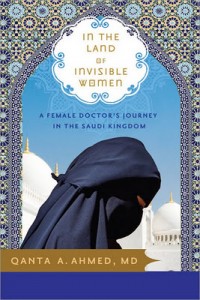- Pages: 464
- Publisher: Sourcebooks, Inc.
- Language: English
- ISBN-10: 1402210876
- ISBN-13: 9781402210877
My rating: 3.5 stars
Buy this book in paper or electronic format
Synopsis:
Qanta Ahmed, a British-born Muslim doctor, is denied a work visa in the United States. She opts to travel to Saudi Arabia where she works in a hospital in Riyadh. Although she was raised as a Muslim, and is familiar with the teachings of Islam, nothing prepares her for the culture shock she experiences in a country under Sharia Law.
The first chapter grabbed my attention immediately as it described a Muslim Bedouin woman lying on an operating table. The woman is in a coma and connected to a respirator. Although the woman is naked, her face is covered by a veil. Doctor Ahmed finds it a striking clash between technology and religion. Meanwhile, the woman’s son is pacing with worry and anxiety over her veil remaining in place. So begins the contrasts and conflicts that Dr. Qanta Ahmed encounters during her years in Saudi Arabia. In this compelling narration, Dr. Ahmed lifts the veil of the upper-class Saudi women and exposes their culture and religion to the Western eye.
The story is set during the years before September 11, 2001. It would have been helpful to the reader if the author had clearly stated the time frame of her story instead of stating it in the final chapters of the book. Regardless, I thoroughly believe that the content outweighs the technicalities of the internal structure. Overall, I found In the Land of Invisible Women: A Female Doctor’s Journey in the Saudi Kingdom to be compelling and thought provoking.
Dr. Ahmed’s story brought to my attention that some of the basic rights I enjoy, and sometimes take for granted as a female American citizen, are denied Saudi women. Despite the fact that Dr. Qanta Ahmed is highly educated and trained to operate complicated medical machinery, she was denied the right to drive a vehicle in Saudi Arabia. No woman in Saudi Arabia has the right to drive.
Dr. Ahmed describes a world where a simple trip to the shopping a mall can bring about a hostile encounter from the religious police, those men dressed in brown, known as the Mutaween. They patrol the streets and public places for any infringements of Islamic law. Their reprimands can range between hostile shouting, imprisonment, flogging, and public humiliation. Mixed gender fraternizing is strictly forbidden, yet Qanta and her colleagues managed to arrange late-night dinners. The fear of being discovered by the Mutaween was always present. Even couples who are legally married must carry proof in the form of a marriage license in case they get targeted by these religious police.
Women are not the only ones who experience repressed feelings in Saudi Arabia. Qanta describes a lost generation of young men in their twenties who have plenty of money, but no worthwhile occupation. They act out their base instincts speeding around in expensive sports cars, causing serious injury or death to themselves and others when they lose control over their vehicles.
Perhaps the most shocking part in the book was the description of the events of 9/11. Even Qanta is surprised and repulsed by the display of prejudice and lack of compassion that emanates from her open-minded colleagues. Some doctors and nurses go so far as to celebrate the event with their patients, eating cake, shouting in glee and applauding as if it were some great, happy occasion. It is not so much surprising as it is callous.
Qanta’s story was as enlightening as I hoped it would be. I learned a lot about the customs and culture. For instance there are several chapters devoted to Qanta’s Hajj, something I knew very little about before reading her memoir. I learned that the women wear Abayah’s, a cloak or over-garment that covers the women from the neck down. The men wear thobes, an ankle-length garment similar to a robe.
Dr. Qanta Ahmed’s account of her time in Saudi Arabia was touching, sobering and illuminating. It helped me to feel more appreciation for my life and grateful for the freedoms I possess. I would recommend this book to anyone interested in women’s rights, Islam or Sharia Law.
Buy this book inpaperorelectronicformat
==================================
April Voytko Kempler is the author of The Altered I, a Holocaust memoir. It is slated for release sometime this winter. You can check out her bloghttp://renogalsays.wordpress.



One Comment
I never thought of having to wear veils when on the operating table. Most of my doctors are from Pakistan and I have noticed that they act very differently towards me as a woman. They ask permission to look at my back for example. All of them have been very respectful. I really want to read this book. Thank you so much for this review!